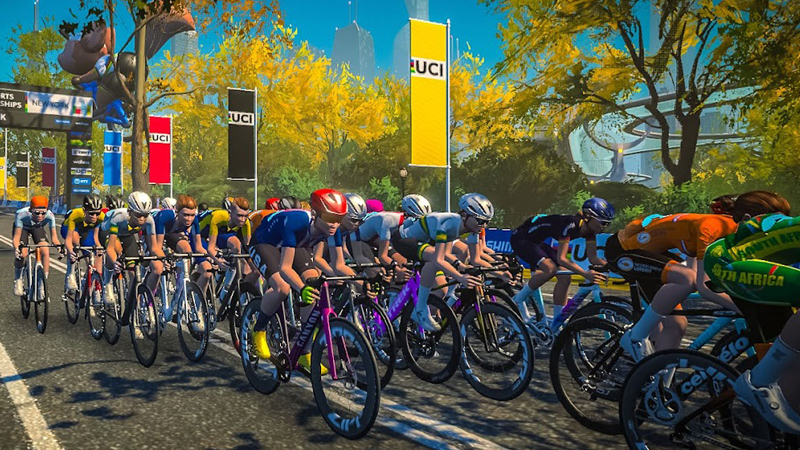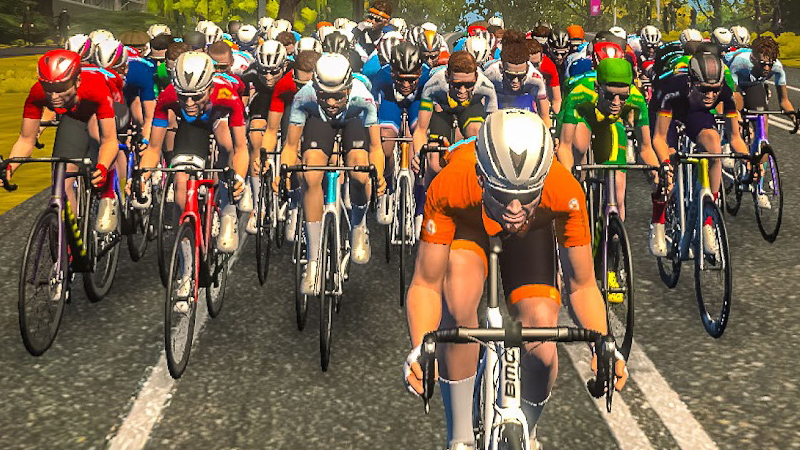Is Zwift's Anti-Doping Policy enough to eradicate cheating culture?
Not according to a paper published in the International Journal of Esports, but Zwift disagrees

A group from Teesside University in Middlesbrough, UK, has published a review in which it claims Zwift fails to meet the purpose of its anti-doping policy. The review, published in the International Journal of Esports, states that due to significant limitations to the policy and a lackadaisical anti-cheating culture, Zwift falls short when it comes to protecting the health and safety of riders not to mention ensuring fairness and integrity across all cycling Esports events.
"A dopogenic environment"
Zwift Esports policy and enforcement is a frequent source of frustration for the vocal minority of competitive cyclists on the platform. Although Zwift rightly reversed the shadowban on a whistleblower following community outcry, E-racers criticise the administration for failing to respond to feedback, being reactive rather than proactive, and its awkward public relations stance.
Focussing more on digital doping, rather than chemical doping, the group from Teesside University feels Zwift's anti-doping policy and its vulnerabilities to cheating and doping create a dopogenic environment for the Esports community. The authors describe a dopogenic environment as one that "allows rather than encourages doping practices" and cite the work of Blackhouse and colleagues:
They define dopogenic as "the sum of influences produced by the surroundings, opportunities, and conditions that promote anti-doping rules violations. Local-level factors (e.g., team, sports clubs, home, neighbourhood, school) work alongside structural factors (e.g., education systems, national and international sports organizations, health systems, government policies, and societal attitudes and beliefs) to create the "dopogenic" milieu." (Blackhouse et al., 2018)
According to the group, "A lack of testing and the somewhat anonymous nature of online racing and uncertainty around what your competitors are doing, along with multiple avenues to cheat (doping, equipment tampering to name but a few) creates and helps facilitate a dopogenic environment."
In response, Zwift's director of PR, Chris Snook, says “we have the most robust system of anti-cheating of any platform. We have already caught and issued suspensions to a number of individuals, and continue to innovate and evolve our systems and processes to catch others.”

A new rulebook
The rise of Esports and the spillover of doping to the gaming sector has led to the evolution of e-doping, or digital doping "using hacks and cheats to gain an unfair advantage in the [electronic] game over other players." (Bafna, P., 2020) The group believes the insidious nature of digital doping on the Zwift platform, like height/weight doping, gender doping, sandbagging, unusual pedalling styles, and data fabrication and modification, cultivates the dopogenic environment.
The latest race content, interviews, features, reviews and expert buying guides, direct to your inbox!
As a result, the authors call for a new set of more robust anti-doping rule violations specific to Zwift, Digital Doping Rule Violations (DDRVs).
"Digital Doping Rule Violations” (DDRVs) will help tackle data manipulation, software hacking, and illegal hardware use on their bikes, their Zwift (or computer) software, and lastly, in-game when racing," the group explains.
If actioned, this new ruleset would replace the current three-tier ban system published by Zwift. In the current system, the first level of infraction - Tier 1 - ERacers are rarely penalized for actions with no intent to gain an advantage. According to the report, there is no case for inadvertent digital doping with no punishment; claiming that athletes either did or did not cheat.
The authors feel that it is the rider's responsibility to ensure their equipment meets fair standards, just as Zwift's anti-doping document states (section 6.1.a), "It is each rider's duty to ensure that no Prohibited Substances enters their body."
According to the authors, the current three-tier sanctions underplay the seriousness of digital doping compared to the anti-doping policy. "There needs to be a two-strike policy for digital doping in the same way as for substance doping so that both policies match up and there is no grey area."
However, Zwift stands behind its three-tier system and denounces the binary nature of the author’s contention that an athlete 'either did or did not cheat' in cases where “no intent to cheat” is in fact appropriate. “An example might be an equipment failure, a battery failure, or power spike,” explained Snook, “more akin to a sprinter stepping into another lane, than deliberate cheating.”
Should Zwift mirror WADA anti-doping policy?
In addition to matching the DDRVs with its anti-doping policies, the authors recommend that Zwift adopts the full WADA anti-doping policy. The authors suggest using Zwift’s pool of elite riders to add transparency to testing among their elite competitor base (post-drug testing in and out of competition). Claiming that it will promote and foster an anti-doping culture and increase the chances of uncovering doping violations through intelligence-based testing.
The authors also suggest Zwift encourages its elite athletes to share their testing stories to send a clear message of clean sport to all members of the Zwift community. Furthermore, the authors recommend Zwift seeks approval to allow anti-doping cases in the Court of Arbitration for Sport (CAS).
However, Snook responds with a reminder that Zwift as a platform is not competitive Esports-focused and that the majority use the platform solely as a training aid. 80 per cent will explore and free ride, 50 per cent will train or complete a workout, and only 20 per cent will compete. Of the 20 per cent that race, only a small percentage is impacted by Zwift’s Cycling Esports Rulebook, either competing in the Zwift Racing League Premier Division, or competitions like the UCI Cycling Esports World Championships.
According to Snook, a full anti-doping program is not appropriate for leisure users, and this distinction is an essential one to point out. "For our highest level events, the World Championships, we have an extremely strong anti-doping program, under full WADA rules, and administered by the ITA / UCI. We're proud of the level of testing and rigour that goes into these events."
All of the racers in the UCI Cycling Esports World Championships utilised manufacturer-supplied standardised equipment that was returned after the race for inspection and tamper detection. For Zwift, Esports competitions such as the Zwift Racing League, only equipment within a threshold of two per cent accuracy is permitted. “While the sport is in its infancy, this is the most effective way to keep it accessible,” explains Snook.
Snook affirms that rider welfare is of the utmost importance, and this is reflected in the Cycling Esports Ruleset. Outside of the Esports competitions noted above, if Zwift receives specific intelligence about potential doping violations, they are passed on to the relevant WADA anti-doping authorities for investigation. “This is the same practice adopted by 'traditional' sports,” he notes, “including cycling whereby individuals are flagged to the appropriate governing body, e.g. British or USA Cycling, who would then investigate.”
Zwift deserves acknowledgement on many levels for attempting to find the optimal balance, and with this, the authors agree. "We enjoy Ecycling and Esports and want to help ensure fair competition and a safe, positive environment free from cheating, doping, and gamesmanship," notes the group.
What they didn't know...
Since publishing their work in the International Journal of Esports, the authors have met with Zwift and learned new information about what the company is doing behind the scenes, which is not publicly available or on any social platforms.
Snook argues “Much of the article is based on the assumption of how Zwift governs Esports based on information the authors found, rather than how Zwift actually governs Esports competition.” If consulted by the authors prior to publication, Zwift would have had the opportunity to explain how the system works to avoid conflicting viewpoints.
Transparency
The authors intend the report to be used as a reference for policy recommendations to help Zwift become a proactive governing body to tackle doping and cheating and promote safe Ecycling.
"It would be proactive for Zwift to share among the community some of the great work they are doing behind the scenes to tackle digital doping," the group states, "as this will send a clear and strong message to deter would-be cheaters.”
Describing why the authors singled out Zwift when there are many other virtual cycling platforms, they stated "Zwift is the largest Ecycling platform, has the greatest number of riders, and is the only one running UCI-sanctioned events."
According to the authors, the onus is on Zwift to set the standard for safety and credibility in Esports and eliminate the dopogenic circumstances that threaten competitors on the platform. It must proactively adapt to the rapidly evolving Esports landscape to promote an inclusive digital doping policy with strict and meaningful enforcement. Only then will Zwift secure the success of Esports and lead the industry into the future while eliminating the enablers of doping and unsafe practices.
A physical therapist with over 25 years of experience, Christopher Schwenker is on a journey to give back to the cycling community for rewarding experiences and fulfilling relationships through the pages of his virtual cycling blog, The Zommunique’, and his cycling-related non-profit, The DIRT Dad Fund.